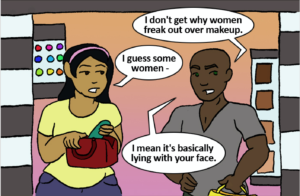But…but what about the men? Whatever will they do?
Let’s clear out some misconceptions. We’re going to talk about feminism, AKA everyone’s favorite subject. Often when someone tries to have a conversation about feminism, the question, “But how does this affect men?” is brought up before a conversation is even allowed to begin. If feminism is supposedly about equal rights then why is it that it only focuses on the problems that women face? What about men’s problems? What about me? These are all questions that are about to be answered, dear viewer. Just you wait.
Feminism is sexist. It’s in the name. Feminism. ‘Fem’-inism. The reason that feminism is primarily concerned with sexism that women face and not so much that men face is because women are the minority or the oppressed group. For something to be considered oppression, it needs to have three components: it’s in the national consciousness of the dominant culture; it’s reinforced through the institutions of society; and there’s an imbalance of economic, social, and political power.
I would say that sexism against women is pretty embedded in the dominant culture, but feel free to disagree.
Socially, the idea that men are dominant and powerful and should be in charge is perpetuated, basically, everywhere. And on the flip side, femininity being associated with weakness is also heavily perpetuated. What other social institutions that keep women down do we also see? Sexualized violence, the objectification and dehumanization of women, victim blaming, and the fact that women can’t walk to their cars by themselves at night because rape is a constant threat.
Economically, women still earn between 77 and 85 cents to every man’s dollar on average. Politically, there are currently 99 women in Congress out of 535 total seats. That means that only 18.5% of people in positions of political power are women.
It’s almost impossible to discuss feminism without bringing up the idea of the patriarchy. The patriarchy is a social system in place that values masculine traits over feminine traits, and in which men are considered dominant to women. While the patriarchy negatively affects all genders, women get the short end of the stick in this scenario; this scenario being reality. Some people on the internet, particularly straight, white, middle-class males, take this as an assault on men.
It’s not an anti-male sentiment; it simply points out that men systematically benefit because of their gender.
However, that’s not to say that men aren’t negatively affected by the patriarchy – a system that, by every account, should be benefiting them.
Feminism opposes harmful gender roles and expectations that negatively affect men and women, and by extension, anyone that doesn’t fit perfectly into the male or female category. When men are told to “grow a set,” or to “man up,” or to “stop acting like a girl,” and basically aren’t allowed to show any sort of emotion, that’s something that feminism also opposes.
Feminism opposes any sort of expectations put on men: to be strong or macho, the breadwinner of the family, and to only like masculine activities. However, feminism doesn’t see anything wrong with being or liking any of these things. It just aims to give men and women and people of all genders the choice to be as masculine or as feminine as they want.
But I should also add that even though feminism is beneficial to men as well as to women, its validity and its importance shouldn’t be dependent on how useful it is to the male gender.
Basically, feminism is not anti-male rights. Focusing on racial issues of minorities is not a threat to white people in the same way that focusing on gender issues is not a threat to men. The goal is not to demonize men but to better understand the social constructions that are in place that affect the way that both genders are perceived.
Basically, women are not evil creatures trying to take away your rights. They’re just trying to have the same opportunities that you do.




















